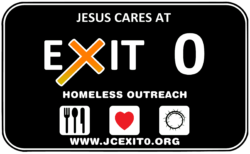Louisville seeks help for rising number of homeless young adults

Pressed by a tepid economy and slashed support programs, Louisville’s young adults increasingly are slipping into homelessness, officials said Monday.
Last year, 555 people ages 18-24 slept in local adult homeless shelters, the city’s homeless database shows. That’s more than twice the number recorded in 2010, and it supports anecdotal growth seen by shelters and providers, said Natalie Harris, director for Louisville’s Coalition for the Homeless.
In addition, a coalition survey this year of 95 people ages 16-24 who were “in crisis,” having lost parents or suffered other setbacks, found that 12 percent were living in a homeless shelter, while others were staying with relatives or in group homes.
“Many of our young adults said they do not have anyone who is there for them to help with such decisions as their personal safety, housing, transportation, their education and their employment,” Harris said.
Alarmed by the numbers, the city and advocates teamed up on Monday to call attention to the issue and ask the community to step up as mentors, donors and volunteers. Mayor Greg Fischer and other officials gathered at a news conference Monday where he urged Louisville residents not to “walk the other way and say it’s not my problem.”
“We have a vested interest … because they are the wage-earners of our future,” said Stacy Deck, vice-chair of the coalition board.
The coalition survey’s results come on the heels of Census Bureau statistics released last week that showed that 18 percent of Jefferson County residents ages 18-64 were living in poverty last year, up from 14.4 percent in 2008, when the recession took hold locally.
Markia Pence, 19 and a 2011 Liberty High graduate, couldn’t find work after dropping out of Kentucky State University. She ran out of options and is now sleeping at the Salvation Army, spending her days at a new YMCA drop-in center for young adults.
‘Something better’
“I know I want something better for myself,” Pence said Monday.
Although the coalition has focused in recent years on the chronically homeless living on the streets, who tend to be in their 50s and 60s, shelter providers in 2011 began seeing increasing numbers of young adults, advocates said.
After years of high unemployment and recently increased competition for low-wage jobs, homelessness among young adults is on the rise across the country, said Barb Anderson, secretary for the National Coalition for the Homeless, who also runs Haven House Services in Jeffersonville, Ind.
At the Haven House shelter, clients aged 18-24 have quadrupled compared with five years ago — now comprising a quarter of its nearly 70 residents on most days, she said.
“I hear the same thing from peers across the country; it’s a growing problem everywhere,” Anderson said.
Providers said some simply can’t find jobs, but others are struggling with family traumas, criminal records, mental illness or substance abuse. Still more dropped out of school or struggled after returning from military service.
Anderson said more than half of the young adults at her shelter serves have grown too old for foster care.
“They can’t go to mom and dad’s house,” Anderson said. “Their support system is just nonexistent.”
Josh Swetnam, director of programs for Boys & Girls Haven, which serves many foster children, said state and federal funds for mentoring and programs to help foster children transition into independent adult living have dwindled in recent years because of budget cuts.
“The need is the highest it’s been, but the resources are diminished,” he said.
Advocates said those with lower educations and job skills, who have not shared in the meager recovery from the recession, have been particularly vulnerable to homelessness — even if they don’t wind up in a shelter and aren’t included in the coalition’s figures.
Leeshinedra Davis, a 19-year-old Iroquois High graduate, found herself struggling to find a job this year that would allow her to continue caring for her nearly 3-year-old son, Adrian. Earlier this year, she had to leave a relative’s house and she spent nearly two months staying a night or two on friends’ couches.
‘It was depressing’
“It was depressing, having to wonder where I’m going to sleep tonight or what am I going to eat,” said Davis, who has since found space with her mother and is taking courses at Jefferson Community and Technical College.
Last year, a group of 25 providers, including the Coalition for the Homeless, formed the Coalition Supporting Young Adults, in hopes of finding better ways to help.
One result came this summer, when the YMCA opened the drop-in center for youth and young adults, and immediately had 40 people seeking food, showers, clothing, help with job hunts and a respite from the streets, said Matt Reed, director of YMCA Safe Place Services.
Among them is Nick Sowders, 23, who said he can’t find work in a tight job market because of a breaking-and-entering charge on his record. He’s been homeless for 11⁄2 months, staying at the Salvation Army.
Another young adult, 19-year-old Jaymez Haskins, also can’t find work after medical problems, an apartment fire and other difficulties combined to leave him homeless. He also is staying at the Salvation Army shelter and relying on the YMCA center for food and clothing.
“A lot of people my age are homeless; people don’t realize it,” he said.
